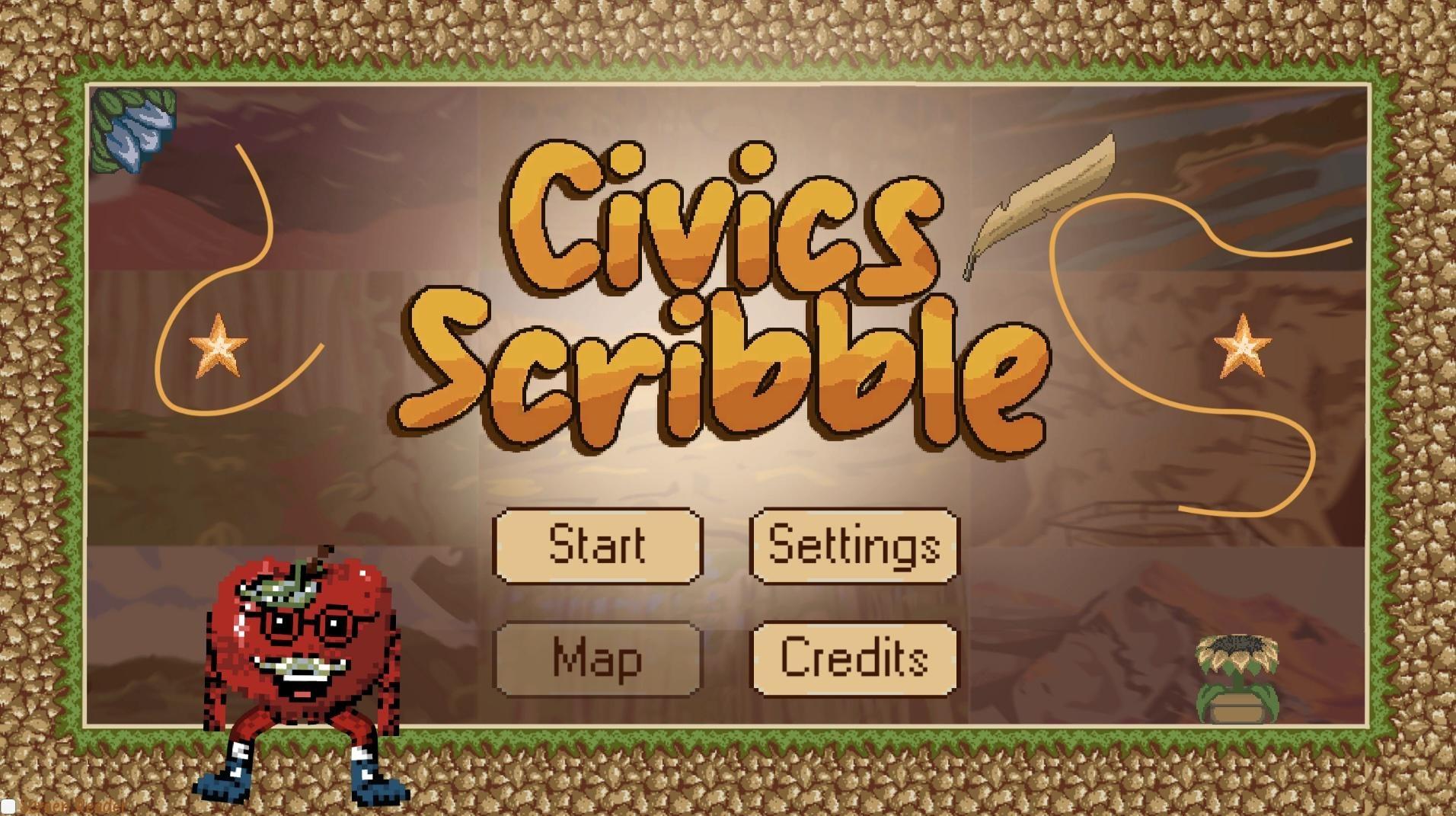Nebraska Public Media (NPM) Labs, the PBS member station’s research and development arm, has been experimenting with generative AI tools to advance the station’s educational public service mission. Generative AI (gAI) is a particular form of artificial intelligence that uses predictive algorithms to generate content based on user prompts, including audio, video, image, and text output.
NPM Labs used gAI in the early brainstorming phase of creating a brand-new interactive game – Civics Scribble. The educational game is based on parts of the U.S. naturalization process. Players navigate Mr. Apple through spatial-reasoning challenges to answer questions inspired by the U.S. Naturalization Exam. Civics Scribble lets players test their knowledge of civics topics, while making their way across nine scenic U.S. parks and dealing with spikes, bouncy blocks, and teleporters.
While NPM Labs has long worked in the interactive learning field, Civics Scribble is the station’s first foray into educational video games. The game was conceptualized, in part, using text-based gAI applications (such as Anthropic’s Claude) to brainstorm plans and to help develop an initial framework.
“Engaging with gAI tools during ideation, brainstorming and review phases can lead to fresh perspectives and inspirations. It can also help creators assess their ideas and consider different perspectives outside their own lived experience,” according to the new Generative AI Policy recently published by NPM.
Recalling some of those initial brainstorming sessions for Civics Scribble, NPM Labs Game Producer Lauren Paatela describes the utility of gAI applications for the station’s team as akin to “putting together a mood board, just much faster.”
NPM Chief Innovation Officer Chad Davis agrees. He finds that while AI may have changed workflows a bit, “it ends up being not radically different from any new technology.”
As with any new tool for creating public media content, the core principles of the PBS Editorial Standards & Practices can provide a framework for preserving trust and credibility.
As PBS guidance on Applying Standards to Generative AI Tools provides: “If using a generative AI tool, it is imperative not to assume that its output is truthful. Producers always need to fact-check any AI output.”
NPM’s policy on gAI, which was published in October 2024, also emphasizes the importance of avoiding the assumption “that [gAI] outputs are innately accurate or free of bias.”
Paatela points out that in exploring and integrating AI tools like ChatGPT and Claude to ideate during content creation, NPM Labs also placed a high premium on ensuring accuracy through diligent fact-checking of gAI output.
By way of example, Paatela recounted how, after significant prompting on her part and “a little bit of pushback” from Claude, the program eventually accepted the idea that a “traditional” wedding dress and flowers would have been quite anomalous within a recession-era 1870s working class setting.
In exploring initial ideas for Civics Scribble, Paatela says: “Every fact was verified and linked to a source.” For her, this means gAI tools “are an interesting place to go to get a general overview of a topic and maybe explore some paths for future research, but should not be used to cut corners.”
One way to further that thinking is the station’s human-centered approach to effectively utilizing gAI applications.
“Human oversight is essential. gAI can technically generate content, but the essence, emotion, nuance, and ethics of purposeful, human-driven content cannot be replicated,” NPM’s policy states.
Notable among the policy’s guiding principles are the People First and People Last core values. “We will prioritize human oversight as essential to ensuring that the outputs from gAI align with our values, quality standards, and ethical considerations and we will quickly address any issues that arise from these experiments. gAI tools are impactful, but not infallible,” the policy’s guiding principles state.
Paatela compares the concept to “the pickle on a sandwich,” where gAI tools are utilized to assist only as needed in order to augment creativity and enhance efficiency. With Claude for example, she found that for the 1870s wedding example, the tool gradually learned with thoughtful human prompting to incorporate a wider array of perspectives into its responses.
Paatela said that tailoring prompts is necessary to get the most balanced information out of gAI. She also finds that prompt engineering is “easier to do with chatbots than image generators.”
This observation reflects the growing body of research published by MIT Technology Review, Center for International Governance Innovation, The London Interdisciplinary School, and Bloomberg, which has shown how image generation tools raise a variety of additional concerns that need to be carefully considered to align with public media values.
“We always have in the backs of our minds the values,” Davis says. “The goal is to make better public media.”
Contact Standards & Practices at standards@pbs.org



